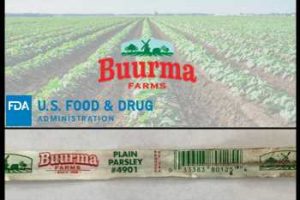Buurma Farms Recalls Plain Parsley

Willard, Ohio-based Buurma Farms Inc. is recalling 320 boxes of its Plain Parsley citing possible contamination with Shiga-toxin producing E.coli, the U.S. Food and Drug Administration said.
The recall involves Buurma Plain (flat leaf) Parsley with a harvest date of August 30, 2021 from their Gregory, Michigan location.
The product was sold and shipped in 30 count cartons to retailers in Ohio and Michigan between 8/31/21 and 9/3/21. It was also sold in 60 count crates to wholesalers in Illinois, Pennsylvania, New York, and South Carolina between 9/2/21 and 9/4/21.
Only plain flat leaf parsley with a lot code of “2A242A6” and a PTI lot code of “2B243A6” is included in the recall.
Individual bunches of flat parsley sold to retailers for purchase by consumers would likely have a “BUURMA FARMS Plain Parsley” twist-tie with a price look-up number of 4901 and a UPC code of 33383 80125.
Meanwhile, the wholesale distribution channels involved in the recall do not have the twist-tie and instead have only a plain red rubber band on the bunch.
According to the agency, a random, routine regulatory sample collected on 9/7/21 at a customer’s distribution center by the Michigan Department of Agriculture and Rural Development tested positive for non-O157 STEC (Shiga-toxin producing E. Coli) and reported 9/13/21.
The sample is currently being genome sequenced to determine if it is pathogenic. Production of the product involved has been suspended until FDA and other regulatory agencies have completed their investigation.
Shiga-toxin-producing E. coli is an organism that can cause foodborne illness in a person who eats a food item contaminated with it. Symptoms of infection may include stomach cramps, diarrhea, and vomiting.
The company has not received any reports of illnesses related to the recalled product to date.
In similar recalls, Monterey, California-based Dole Fresh Vegetables, Inc. recently called back a limited number of cases of conventional Curly Leaf Parsley citing possible contamination with non-O157 Shiga-Toxin producing E. coli.
Source: Read Full Article
